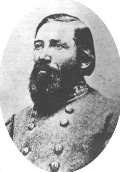 Open main menu
Open main menu
 Open main menu
Open main menu

C. A. Battle
(1829 - 1905)
Home State: Alabama
Command Billet: Commanding Regiment
Branch of Service: Infantry
Unit: 3rd Alabama Infantry
Before Sharpsburg
General Battle was admitted to the practice of law in 1852, and in 1856 was a sub-elector on the Buchanan ticket. In the Alabama Democratic State convention of 1860 he was, on motion of William L. Yancey, made elector for the Montgomery district and delegate to the Charleston convention, and subsequently he canvassed Alabama, and visited the cities of Charleston, New York, Boston and Philadelphia in company with Mr. Yancey.
Upon the capture of Harper's Ferry by John Brown, Mr. Battle organized the Tuskegee light infantry and purchased arms and uniforms.They were assigned to the Second Alabama regiment, of which Tennent Lomax was elected colonel, Cullen A. Battle, lieutenant-colonel, and Samuel Marks, major.
Not long after this the Alabama legislature passed the ordinance of secession, and at the same time annulled all military commissions previously issued above the rank of captain. Lomax and Battle immediately shouldered muskets and served as privates until the Confederacy was formed. The Third Alabama regiment was at once organized from the companies (of the 2nd Regiment), and its officers elected were Jones M. Withers, of Mobile, colonel; Tennent Lomax, of Montgomery, lieutenant-colonel, and Cullen A. Battle, of Tuskegee, major. The Second battalion, under Major Battle, was ordered to Virginia, and early in April reported to Lieut.-Col. E. Kirby Smith, commanding at Lynchburg. Being joined a few days later by the other battalion, under Lomax, the regiment was mustered into the Confederate service, by Colonel Smith, about April 12, 1861.
The regiment was soon ordered to Norfolk, and during the Confederate occupation of that post, Colonel Withers was promoted and sent west, and Lomax became colonel, and Battle, lieutenant-colonel. The regiment was assigned to Mahone's brigade early in 1862, and in that command participated in the battle of Seven Pines, where Colonel Lomax was killed. Battle was now promoted colonel, and early in June his regiment was transferred to General Rodes' brigade.
On account of a wound received at Seven Pines, Colonel Battle was kept from the field until the Maryland campaign.
On the Campaign
In his report of the battles of Boonsboro and Sharpsburg, General Rodes wrote: "The men and officers behaved well, but Colonel Gordon's Sixth Alabama, Major Hobson's Fifth Alabama, and Colonel Battle's Third Alabama deserve special mention for admirable conduct during the whole fight.'' General Rodes recommended the promotion of Gordon and Battle, but the honor could be conferred upon one only, and fell to Gordon. Colonel Battle was slightly wounded at Sharpsburg
The rest of the War
During the battle of Fredericksburg he was seriously injured by his horse falling upon him. During the flank movement of Jackson's corps at Chancellorsville, the colonel, still disabled, but anxious to participate in the fight, accompanied his regiment in an ambulance, and attempted to mount his horse to lead his men in the attack, but was unable to keep his saddle, and was sent back to his ambulance by General Rodes. Mortified by his condition and fearing that his usefulness was ended, he sent forward his resignation, but it was disapproved by General Rodes, who renewed his recommendation of promotion, asking that Colonel Battle be assigned to the command of Rodes' brigade.
He was able to take part in the Gettysburg campaign, and was distinguished in the fighting of July 1st. General Ramseur wrote: "Colonel Battle, with the Third Alabama, rendered brilliant and valuable service. Attaching his regiment to my command, on his own responsibility, he came in at the right place at the right time and in the right way." General Ewell also mentioned the movement in complimentary terms. Colonel Battle was promoted brigadier-general on the field and assigned to command of Rodes' brigade.
He led the Brigade through the 1864 Overland Campaign, and later with General Early in the Valley. He was wounded in the knee at Cedar Creek. While on sick bed he was informed that his commission as major-general, dating from the battle of Winchester, had been forwarded to the army, but General Battle was never able to take the field again.
After the War
For two years he was upon crutches. Resuming the practice of law in Alabama, after the close of hostilities, he was elected to Congress, but was not permitted to take his seat. In 1870 his name was urged by his friends for nomination for United States senator, and he would perhaps have received that honor, but the legislature was advised from Washington not to elect any man who would not take the oath. His name was, then withdrawn, and Judge Goldthwaite was nominated and elected.
General Battle was a prominent member of the convention which framed the present constitution of Alabama. He eventually moved to New Berne, North Carolina, where he edited a newspaper.
References & notes
His bio details here from Joseph W. Wheeler's Confederate Military History of Alabama (1899). A typescript copy of that manuscript is in the University of Alabama Libraries [finding aid]. He wrote his memoirs after the war, only recently published.
Birth
6/1/1829; Powelton, GA
Death
4/8/1905; Greensboro, NC; burial in Blandford Cemetery, Petersburg, VA